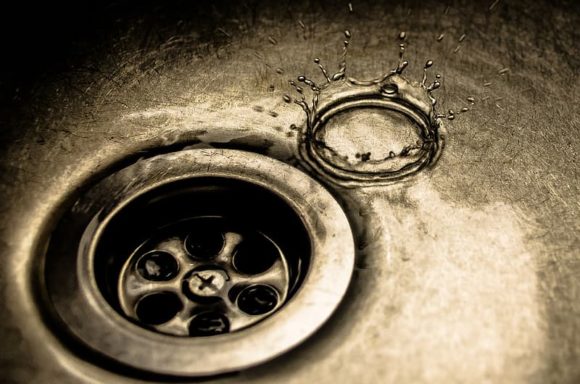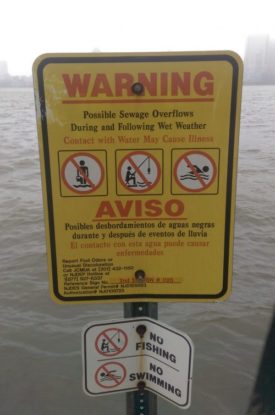 Two EOAS faculty members describe the ways COVID-19 might impact New Jersey’s waterways and water quality
Two EOAS faculty members describe the ways COVID-19 might impact New Jersey’s waterways and water quality
Looking for hand sanitizer, spray disinfectants, cleaning wipes, paper towels, and toilet paper? You are probably now out of luck. These products and others have already disappeared from stores all over New Jersey.
As global nations work to block transmission of COVID-19 and care for those infected, medical doctors and other health care providers are urging people to wash their hands and clean. What are some of the implications of these behaviors for the environment, locally in New Jersey, and globally?
Will the increased use of hand sanitizer and chemical cleaners further increase water pollution? Will the additional household and medical waste impact our rivers, lakes, and oceans in dangerous ways?
To better understand the ways COVID-19, the novel coronavirus, might impact our fragile New Jersey ecosystems and the planet, we spoke with Rutgers Earth, Ocean, and Atmospheric Sciences (EOAS) faculty members Nicole Fahrenfeld and John Reinfelder.
Below, they explain the ways COVID-19 might impact New Jersey’s water quality, how the global scientific community is exploring these issues, and what we, as ordinary citizens, striving trying to protect ourselves and others from the novel coronavirus, can also do to protect the environment and local infrastructure at the same time.
Nicole Fahrenfeld, associate professor, Civil and Environmental Engineering, School of Engineering, Rutgers University-New Brunswick
New Jersey’s wastewater treatment plants are designed to remove things from the water that are supposed to be drained and flushed, such as urine and feces, soap from hand and dish washing, and toilet paper. Therefore, it is especially important at a time like this that people maintain their normal healthy environmental practices by not disposing of items like wipes, sanitary napkins, pharmaceuticals, and toxic chemicals in sinks and/or toilets.
Likewise, as restaurants close down in large numbers due to COVID-19, it is vital that employees remember not to flush cooking oil from large industrial fat fryers down the drain because large amounts of oil and grease can agglomerate in our sewers and become the fatbergs many of us have heard about that block sewage flow. Let’s do what we can to keep the sewers flowing properly.
New Jersey residents need to remember that as long as there are no advisories about problems with the drinking water, our tap water will continue to be safe to drink and cook with. This serves as a reminder that we benefit from having federal agencies work to protect our water quality.
But nevertheless, as summer approaches, it is important as always that New Jersey residents heed all warnings and not recreate, wash, or swim near combined sewer outfalls. Over 700 cities in the U.S. have outdated combined sewer systems, including several municipalities in New Jersey. Combined sewers collect stormwater runoff and wastewater in the same pipe. As little as a quarter of an inch of rainfall can cause an overflow event, releasing the sewer contents into the receiving surface water. Therefore, it should not be surprising that wet weather is associated with waterborne illnesses from fecal matter from humans and animals, including geese and deer – these fecal indicators are not specific to humans. These outfalls are marked and mapped so that residents can avoid them during and following wet weather.
In the past, scientists have tended to study our drinking, surface, ground, wastewater, freshwater and oceans separately. But more recently we have been examining our water holistically – as One Water. One Water acknowledges for example that we have defacto refuse given that there can be multiple water intakes and outputs along a river. We are also increasingly moving toward including the environment under One Health – appreciating how human, animal (livestock), and natural environmental health are connected in one system. Approaching environmental research in this way will help scientists at Rutgers and beyond to better understand the impacts of a viral pandemic such as COVID-19 on our water systems and global environment.
COVID-19 is raising new questions that we will be eager to address in my lab, particularly related to sewage epidemiology. This pandemic is therefore opening doors for increased collaborations and research.
To notify New Jersey residents when combined sewer overflows (CSOs) might be occurring, the NJ CSO Group maintains the CSO Notification System. More information about CSOs is also available on the State of New Jersey Department of Environmental Protection Division of Water Quality website.
John Reinfelder, professor, Department of Environmental Sciences, School of Environmental and Biological Sciences, Rutgers University-New Brunswick
With large numbers of people staying home from work and school due to COVID-19, there will likely be an overall decrease in domestic and industrial water use and a shift in the discharge of treated municipal wastewater from urban to suburban waterways. As a result, some waterways in New Jersey and around the country may experience “blue water days” over the next several weeks, just as industrial centers in China and Italy have experienced “blue sky days” due to reduced air pollution as industrial activities were curtailed. However, others in more residential areas may experience higher than usual loads of wastewater contaminants.
Wastewater discharge adds nitrogen and phosphorus to receiving waters, which can stimulate excess plant and phytoplankton growth and may contribute to harmful algae blooms. Much of the excess plant biomass decays relatively quickly consuming oxygen in the water in a process known as eutrophication, and the simultaneous release of organic matter may exacerbate the oxygen drawdown. With lower discharges of wastewater to urban waterways, algal growth and oxygen depletion should decrease. At the same time, higher amounts of wastewater discharge may be directed to waterways in suburban areas as large numbers of people stay home.
Greater use of disinfectants and lower volumes of wastewater overall could result in higher concentrations of certain chemicals in wastewater. While everyday disinfectants such as bleach, peroxide, and alcohol will likely be effectively removed during the wastewater treatment process, antibiotic compounds may spike in wastewater discharge.
The current period of reduced human activity needed to reduce the effects of the spread of COVID-19 on public health may give environmental scientists and managers an opportunity to evaluate the impacts of everyday activities associated with wastewater discharge on the health of rivers, estuaries, and the coastal ocean.
This article originally appeared on Rutgers Institute of Earth, Ocean, and Atmospheric Sciences website.


